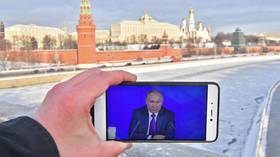Is the US really going to ban Russians from buying iPhones?

The extreme new sanctions threat has sparked consternation and criticism in equal measure.
Recent reports that the US is contemplating introducing harsh new sanctions that could leave Russia unable to import smartphones, including iPhones, as well as aircraft components and other equipment has led to intense speculation among the general public. But what is the reality?
1. How likely is it to happen?
It is clear that sanctions on this scale could indeed be introduced, but only in an extreme situation, such as Russia and Ukraine directly engaging in hostilities.
2. Wouldn't there be bigger problems to worry about?
An all-out war between Russia and Ukraine would blow economic concerns out the water, given the extent of the political crisis. No one would care about this or that company suffering losses on the Russian market when half of Eastern Europe is fighting a bloody conflict.
3. What other sanctions could be imposed?
If a war erupts, sweeping sanctions would be imposed, with telecommunications being just one part of it. They would include blocking Russian banks, pressuring SWIFT to cut Russia off from the system, phasing out exports of Russian oil and halting the Nord Stream 2 pipeline. Energy sector-related sanctions would translate into a big challenge for Europe, so they would be imposed gradually and selectively. This scenario, however, is likely if there is indeed a war.
4. How important are Apple products, anyway?
All the bravado about how Russia would be just fine without iPhones is misguided. As we’ve seen in the past, export-related sanctions could encompass US-made components in equipment manufactured elsewhere, as well as components manufactured abroad using US technology. This means that if, say, Chinese or Korean smartphones contain any American-made parts or parts manufactured based on American solutions, they would not be imported to Russia. The US authorities would have the right to prosecute anyone who does so.
5. Are there any precedents?
It’s tempting to compare the potential sanctions that would affect Russia’s telecommunications sector with those imposed by the US on China. America has been keeping a tight lid on Chinese tech industry exports. The Chinese are not allowed to sell CPUs on the US market, even if they are manufactured in other countries using American technology. However, when it comes to China, America’s goal is to stall the technological advances of a competitor.
6. What would it mean for Russia?
Russia is an entirely different story. In Moscow’s case, the sanctions would affect regular people and breed discontent. Not having access to certain devices or software would have an impact on everyday life. It’s hard to predict what outlet this anger might eventually find.
7. Why is Washington contemplating this now?
If this really happens, it will signify a new vector in US sanctions policy. In the last 20-25 years, America has focused on punishing the elite and placing limitations on key industries. They tried to spare regular people, even though, of course, everybody feels the weight of the sanctions. Now they might try a different approach – removing some important technology that everyone has become used to, and blame the Russian government again. It’s hard to tell what this might lead to, but we can’t rule it out.
In any case, such radical steps would likely only be taken if there is a direct armed conflict between Russia and Ukraine. We still think this is a very unlikely scenario. However, anything is possible in modern politics.
Meanwhile, we should all hope that the famous red rotary phone that once connected the White House and the Kremlin in times of crisis can be dusted off.
The statements, views and opinions expressed in this column are solely those of the author and do not necessarily represent those of RT.












